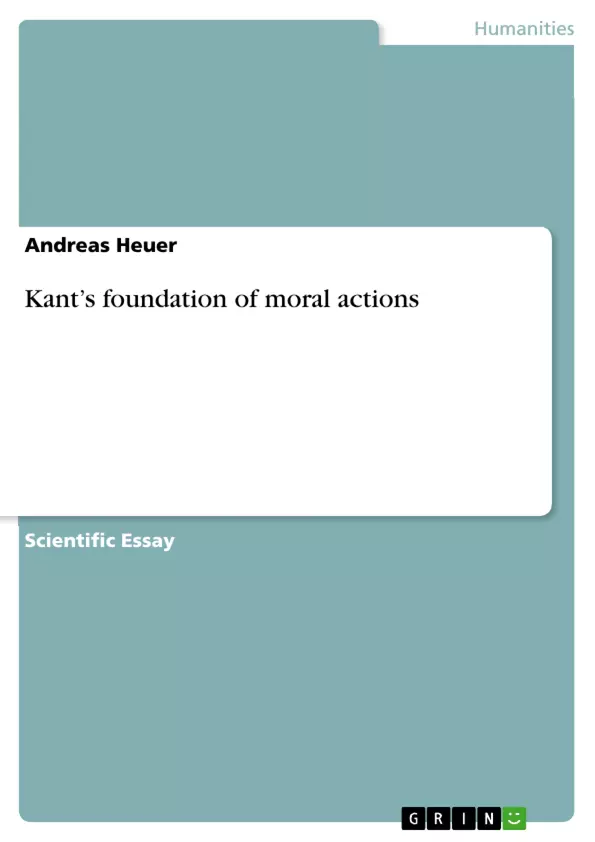Recently there are on-going discussions in moral philosophy and neurology: Do we act as free agents making moral decisions? Are we accountable for our actions? Do we have a free will? Those who oppose the idea of a free will come to the conclusion that “a living being never truly makes a choice. We only become aware of such things after we have made them.” Kant would have firmly been against this idea when it comes to the foundation of moral principals and moral actions. In this article I will look further into Kant’s position looking for counter arguments and finally show the difference between the free will to wish something and the free will to act according to our will.
Inhaltsverzeichnis (Table of Contents)
- Kant's Foundation of Moral Actions
- Reason and the Categorical Imperative
- Free Will and Moral Decisions
- The Problem of Determinism
- Freedom of Will and Freedom of Action
- Kant's Position on Free Will and Moral Decisions
- Conclusion
Zielsetzung und Themenschwerpunkte (Objectives and Key Themes)
This article examines Kant's perspective on free will and its connection to morality. It delves into his argument for the existence of free will as a necessary condition for moral action, exploring the concept of the categorical imperative and its role in shaping ethical decision-making.- Kant's argument for free will as the foundation of morality
- The categorical imperative and its universalizability principle
- The role of reason in moral decision-making
- The distinction between freedom of will and freedom of action
- Criticisms of Kant's free will theory from modern neurology and philosophy
Zusammenfassung der Kapitel (Chapter Summaries)
- The article begins by introducing the ongoing debate in moral philosophy and neurology regarding free will and its implications for moral responsibility. It highlights Kant's stance as a defender of free will and introduces his key questions about knowledge, action, hope, and human nature.
- The chapter then dives into Kant's concept of transcendental idealism, arguing that the world we experience is shaped by our consciousness and that moral principles must derive from reason, not empirical observations.
- This chapter explores Kant's central concept of the categorical imperative, which states that moral actions should be guided by a principle that can be universally applied. It examines the role of reason in guiding free will towards this imperative.
- The chapter presents opposing arguments from philosophers like Hume and Schopenhauer, who believe that free will does not exist. It also explores the views of neurologists who argue that actions are determined by subconscious brain processes.
- The chapter clarifies Kant's understanding of free will and its limitations, drawing a distinction between freedom of will and freedom of action. It emphasizes that while we may have the freedom to want something, our actions might be limited by internal or external factors.
Schlüsselwörter (Keywords)
The key concepts and themes explored in this text include Kant's philosophy of morality, free will, the categorical imperative, transcendental idealism, determinism, neurology, and the distinction between freedom of will and freedom of action. These ideas are central to understanding Kant's view on moral responsibility and the role of reason in shaping human behavior.Frequently Asked Questions
What is Kant's view on free will?
Kant argues that free will is a necessary condition for morality; without the ability to choose our actions through reason, moral accountability would not exist.
What is the Categorical Imperative?
It is Kant's central moral principle: "Act only according to that maxim whereby you can at the same time will that it should become a universal law."
How does Kant distinguish between freedom of will and freedom of action?
Freedom of will is the internal capacity to choose based on reason, whereas freedom of action is the external ability to carry out those choices without hindrance.
Does modern neurology challenge Kant's moral philosophy?
Some neurologists argue that brain processes determine actions before we are conscious of them, which directly opposes Kant's idea of the rational, free agent.
What is transcendental idealism in the context of morality?
It is the idea that while our empirical world is determined, we can conceive of ourselves as free moral agents in a "noumenal" or intelligible realm.
- Arbeit zitieren
- Dr. phil. Andreas Heuer (Autor:in), 2009, Kant’s foundation of moral actions, München, GRIN Verlag, https://www.grin.com/document/134821



